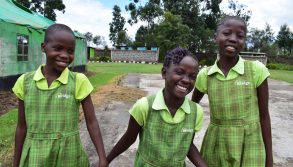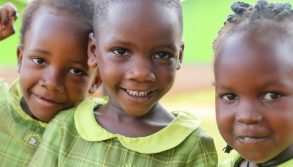Honouring Malala: 21 things you need to know about girls education
11 July 2018
Malala Yousafzai is perhaps the best known advocate for girls education. In 2012, she was shot in the head by the Taliban for the ‘crime’ of going to school. Girls were prohibited by the Taliban from going to school in the Swat Valley, north-east Pakistan where she lived.
Miraculously, Malala survived. She was flown to the United Kingdom, where she now lives and today she is studying at the world famous University of Oxford. Her advocacy for girls education has since grown into a global movement. In 2013, she founded the Malala Fund with her father – Ziauddin Yousafzai – to champion every girl’s right to 12 years of quality education. She is helping to change the world.
Born on 12th July 1997, on Malala Day 2018 she’ll be turning 21-years-old.
In her honour, here are 21 things you need to know about girls education:
- 130 million girls around the world are out-of-school today.
- Girls are 1.5x more likely than boys to be completely excluded from primary education.
- Of the 750 million people in the world who are illiterate, two-thirds of these will be women.
- Educated women have fewer pregnancies and are also less likely to become pregnant as teenagers.
- An educated girl is 3x less likely to become HIV positive.
- Educated women earn more for every year of schooling that they complete (typically, a woman will reinvest 90% of her income in her family; whilst men reinvest between 30-40%).
- A child born to a literate mother is 50% more likely to survive past the age of five.
- Across 18 of the 20 countries with the highest prevalence of child marriage, girls with no education are up to six times more likely to marry as children than girls with a secondary education.
- Twelve years of education for every girl would result in a 64% drop in child marriage.
- Girls are 90% more likely to be out of secondary school than those living in areas without violence.
- A young girl in South Sudan is 3x more likely to die in childbirth than complete primary education.
- If all girls received 12 years of education, the frequency of early births would drop by 59%.
- And, child deaths would decrease by 49%.
- Data from the World Bank shows that women have a 1.2% higher rate of return on investment in education than men.
- If every girl received 12-years of education it would add US $12 trillion to global GDP.
- 21.3 million people are refugees today. Almost 80% of all refugee adolescents are out of school; those left behind are mostly girls.
- In 2015 UNICEF and the World Health Organization estimated that at least 500 million women lack sufficient resources to manage their periods. With insufficient menstrual solutions, many girls miss a week of school each month or they drop out for good.
- Only 34% of girls in the world’s poorest households will complete school.
- In many countries, girls are banned from school for being pregnant.
- Studies have shown that free school uniforms can reduce the incidence of teen marriage by 20%.
- And, teen pregnancy by 17%.
Malala’s school in Pakistan was an affordable private school, just like the ones that Bridge runs, and her dad was the headmaster. There are thousands of girls at schools like these across the world that are providing opportunity and education when other options are limited. Girls like Natasha want to change the world too and who knows maybe one day, they’ll be UN Ambassadors as well. Happy Birthday Malala.
Discover how Bridge is empowering women and creating strong, confident girls.









